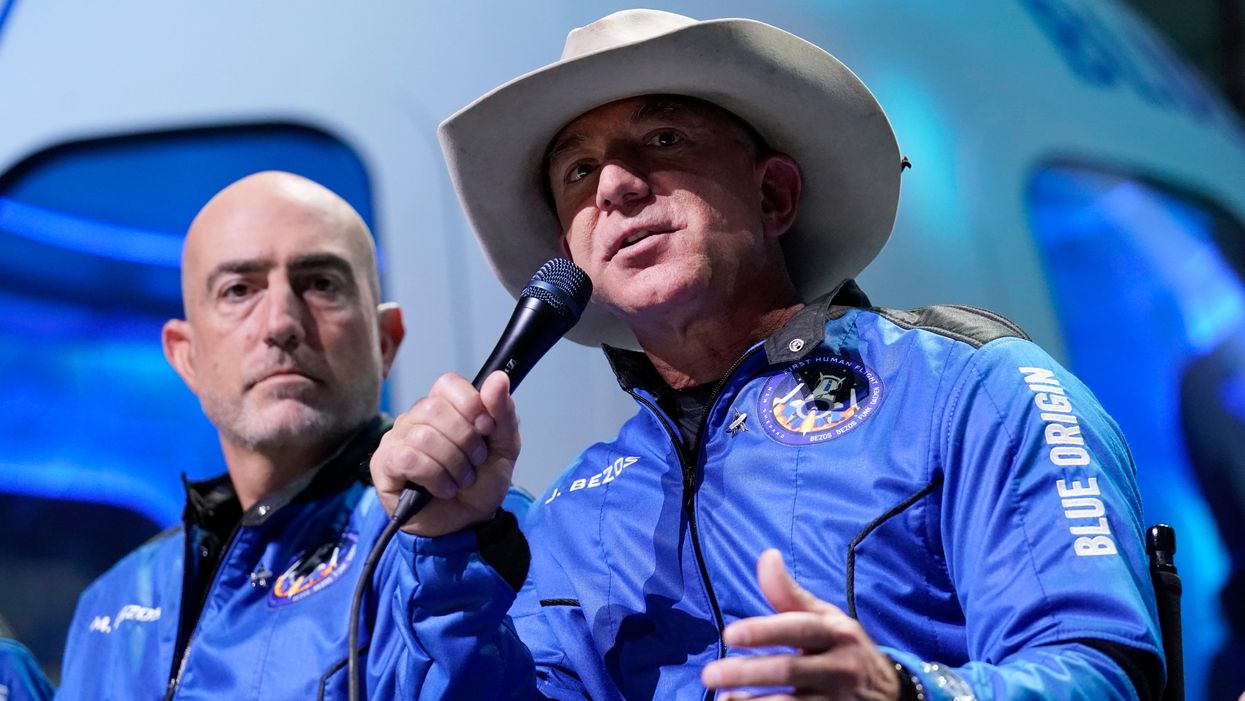Science & Tech
Danielle Sinay
Jul 21, 2021

“When you get up there and you see it, you see how tiny it is and how fragile it is,” Bezos said upon landing.
Copyright 2021 The Associated Press. All rights reserved.
Jeff Bezos, the richest man on Earth, flew to suborbital space aboard Blue Origin’s New Shepard rocket this week. Since returning to his home planet, however, the Amazon founder has faced a round of criticism for gallivanting into the galaxy then cheekily thanking Amazon staff for funding the trip — as well as tremendous ridicule regarding his rocket’s remarkable resemblance to a penis.
Now, critics are blasting Bezos not into space but for his environmentally unfriendly journey when he specifically acknowledged how delicate the planet really is upon landing.
“We live on this beautiful planet. We saw this, you can’t imagine how thin the atmosphere is when you see it from space. We live in it and it looks so big. It feels like, you know, this atmosphere is huge and we can disregard it and treat it poorly,” Bezos said on MSNBC, in one of his first interviews after returning to Earth.
"We have to build a road to space so that our kids and their kids can build a future," Jeff Bezos tells @Sruhle on… https://t.co/P7Dsb0WE3s— MSNBC (@MSNBC) 1626793188
“When you get up there and you see it, you see how tiny it is and how fragile it is. We need to take all heavy industry, all polluting industry, and move it into space, and keep Earth as this beautiful gem of a planet that it is,” he continued, adding that while this take “decades and decades to achieve…big things start with small steps,” such as his suborbital “space tourism” flight.
However, what Bezos doesn’t seem to realise, is that these joy-ride space journeys he loves so dearly have catastrophic consequences for our “gem of a planet.”
“Space travel leaves an awful lot of carbon footprints behind,” Nathaniel Graham, electrical and environmental engineer and Founder of FavorablEnergy, tells Indy100. “Many space travels are powered by hydrogen fuel today, and even though hydrogen is considered a clean fuel, the process that produces it is not. About 99% percent of the world’s hydrogen is generated using gas or coal.”
Jeff Bezos says the earth is “fragile.” We didn’t need to go to space to know that. Let’s tax the wealthy to inves… https://t.co/pNdJUkvfKP— Congressional Progressive Caucus Center (@Congressional Progressive Caucus Center) 1626793555
Commenting on Richard Branson’s claim that Virgin Galactic flights will leave equal carbon footprints to that of a business class passenger on a flight from London to New York, Graham adds that, assuming Branson is correct, “the Co2 footprint of each passenger on the spaceship is about 1238 kg,” or 2,729 pounds. “Since space travel is currently less frequent, this is not really a big deal. But if space flights become frequent — as many companies are working tirelessly to make it — then there will be catastrophic consequences for our environment.”
The Guardian also reported that “one rocket launch produces up to 300 tons of carbon dioxide into the upper atmosphere, where it can remain for years,” regardless of how “green” the billionaire-turned-astronauts claim their flights to be.
Even #NewShepard's relatively clean liquid hydrogen-oxygen #fuel can increase the number of clouds in the… https://t.co/nF2YuPbe9s— Mal Fletcher (@Mal Fletcher) 1626848500
Top 100
The Conversation (0)













